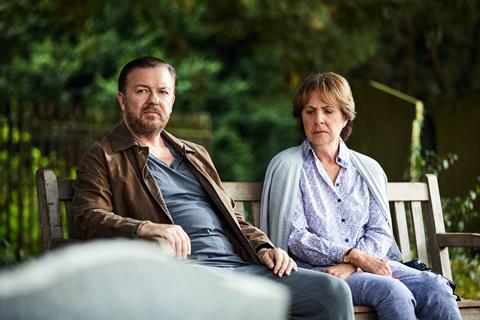Famously atheist, Ricky Gervais undoubtedly doesn’t believe in the ‘after life’ but his dry humour and raw honesty is a reminder that working through bereavement can be slow and agonising.

Ricky Gervais wrote cult classic The Office. It won multiple awards and inspired the US equivalent, which is the most viewed programme on any streaming platform. Yet the comedian says he gets far more messages about After Life than any of this other projects.
Series three of the moving show came out on Monday and it’s already shot to the top of the UK Netflix chart. For those who haven’t seen it, the story follows the life of a man who lost his wife to cancer and is consumed with grief. But rather than crying for weeks on the kitchen floor or having a breakdown, he has (reluctantly) chosen to keep living but refuses to find joy in anything.
Within the bleak mundanity of his job as a local news reporter and sitting in silence with his elderly father, who has dementia, there are real moments of tenderness. In particular, the scenes where Gervais’ character goes to visit his wife’s grave and sits on a bench next to another widow. The woman, played by Penelope Wilton, experienced her own agonising grief but hasn’t succumbed to the same depression that has taken hold of Gervais. In one poignant moment Gervais opens up to her about his previous intentions of suicide. He said: ‘Even though I’m in pain it’s worth sticking around to maybe make my little corner of the world a slightly better place.’ She replied: ‘Happiness is amazing. It’s so amazing, that it doesn’t matter if it’s yours or not.’ Despite his resistance, she speaks real kindness and affirmation over him in his misery.
‘Happiness is amazing. It’s so amazing, that it doesn’t matter if it’s yours or not.’
In church on Sunday someone came to the front to say that they felt God wanted the congregation to know that when the world says pursue happiness at all costs - but it’s missed the point. She said there is something profound in experiencing joy and deep sadness at the same time - and it stuck with me. We shouldn’t fight it and assume that we’re doing it wrong if we’re not maintaining pure joy. Living life to its fullest is about experiencing every emotion in its entirety, and no one will be consistently happy. But we have Jesus, to support us and comfort us when we have trials to walk through.
For those who do decide to brave the strong language and crude references in After Life will find some deeply moving moments. They will be reminded that grief does not have a time stamp. We can rush to support people in the immediate aftermath of loss but many say that it’s months down the line, when the phone’s stopped ringing and they’ve finished the last of the donated frozen lasagnes, that they feel truly lonely. It can be hard to keep the momentum of support going when your life has carried on but someone else’s has stayed painfully still.
Allow someone who’s grieving to experience the profound combination of joy and sadness that will become so familiar to them.
As individuals and a church community I believe we can be different. We can be consistent even when the adrenaline and immediacy of the situation is over. We can continue to show love and offer companionship when others have stopped calling. We can recognise that the end goal for that person is not re-establishing happiness, but allowing them to experience the profound combination of joy and sadness that will become so familiar to them.
And above all we won’t rush them. There’s no timeline for healing and Ricky Gervais’ After Life is a clear reminder of that.




































No comments yet